
Skunks can be a nuisance for homeowners, often damaging gardens and yards. When faced with a skunk problem, many people turn to professionals for help. A skunk trapper can effectively remove these pests and ensure they do not return.
Finding a reliable skunk trapping service nearby can significantly ease the tension of dealing with unwanted visitors. Many homeowners seek assistance from a skunk trapper to handle the situation safely and humanely. These experts understand skunks' behavior and use the right techniques to capture them without causing harm.
In addition to effective removal, a skilled skunk trapper can provide valuable advice on preventing future infestations. Homeowners can proactively protect their properties by closing off access points and employing deterrents. Investing in professional skunk trapping services leads to a more peaceful living environment.
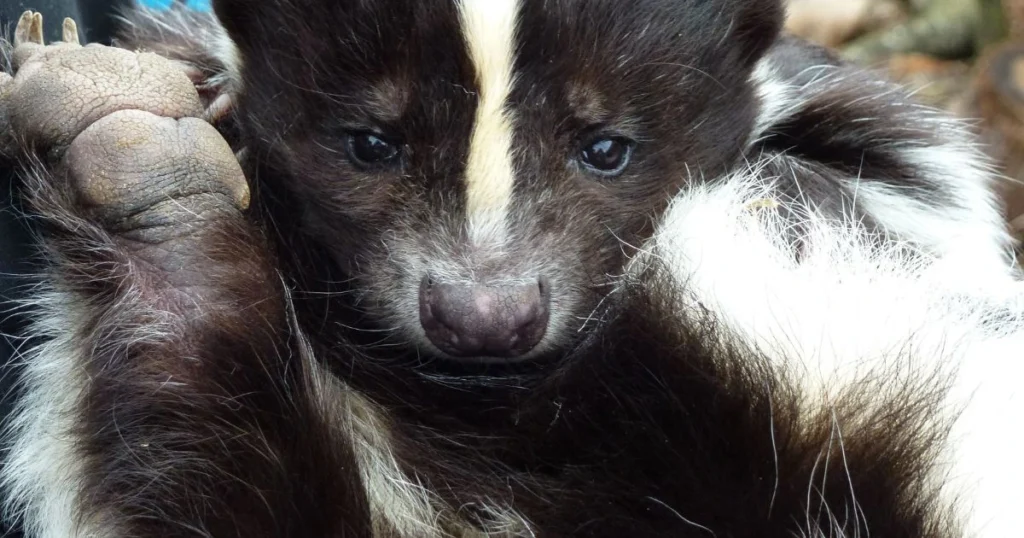
Skunks are nocturnal creatures with distinct habits and traits. Recognizing their behavior can aid effective skunk-trapping efforts, particularly in residential areas.
Skunks typically inhabit areas with ample food sources, such as urban gardens, forests, and agricultural lands. They favor shelters like burrows, abandoned buildings, or dense vegetation for nesting. Territorial by nature, these animals can cover significant ground, often foraging within a 2-mile radius of their den.
Skunk territories can overlap with other skunks, leading to confrontations. Skunks communicate with neighboring skunks using scent marking, visual displays, and vocalizations. This behavior can influence their movement and increase the likelihood of human encounters, making it critical for a skunk trapper to understand these patterns when planning to trap skunks.
Infestations often occur due to easily accessible food sources, such as pet food, garbage, or fruit trees. Skunks are opportunistic eaters drawn to areas with high food availability. Gardens offering vegetables or insects can also attract them.
Structural entry points, like gaps under decks or foundations' openings, provide them shelter access. This may lead to skunks taking residence in backyards or basements. Residential settings with these features are prime targets for skunk trapping near me as they create environments conducive to skunk habitation. Recognizing these factors can assist in preventing and addressing skunk infestations effectively.
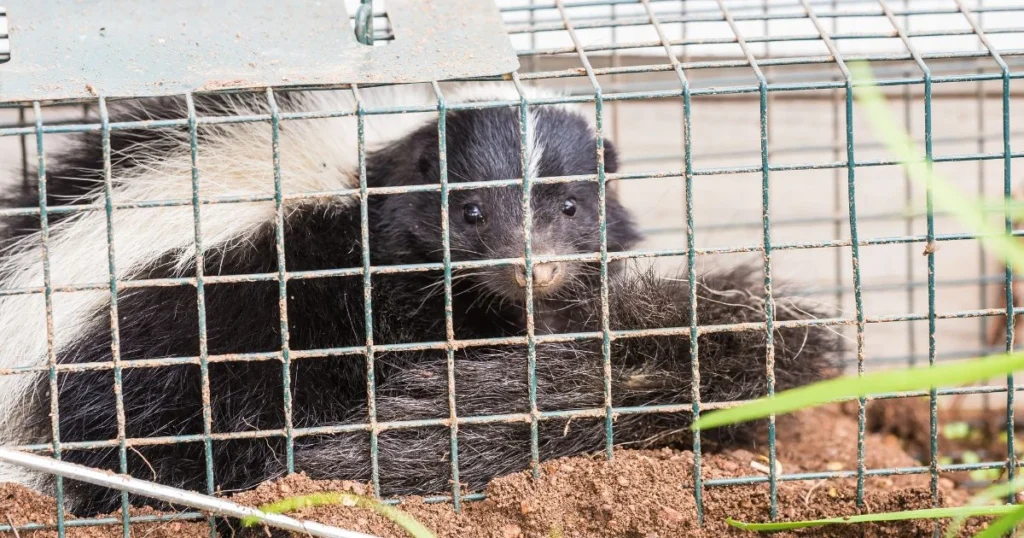
Skunks can pose several health risks and problems for homeowners. Understanding these risks is essential for effective management and control.
Skunks are known carriers of rabies, a viral disease that can affect mammals, including humans. The transmission occurs primarily through bites or scratches. Symptoms of rabies can be severe, leading to paralysis and death if untreated.
Skunks can transmit other diseases, such as leptospirosis and tularemia, in addition to rabies. These can spread through contact with infected urine or feces or through bites. It is crucial for anyone handling skunks or encountering them in the wild to exercise caution and seek medical advice if bitten.
Skunk problems often extend to property damage and unpleasant odors. Skunks dig and burrow, creating holes in lawns and gardens, which can lead to significant landscaping issues.
The most notorious issue is skunks' strong odor, which they use as a defense mechanism. This odor can linger on property, including buildings and vehicles. Professional skunk odor removal is often necessary to eliminate these smells effectively.
Skunk control services can help mitigate these problems, preventing future infestations and quickly addressing odor issues. Implementing exclusion measures will further protect the property from these pests.
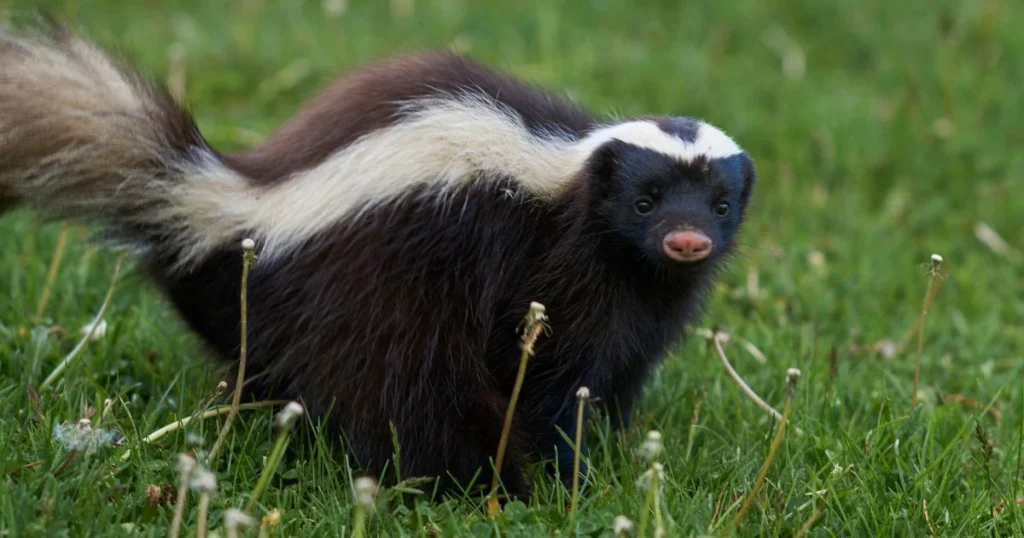
Taking strategic steps to effectively deter skunks from invading residential areas is important. Focusing on securing food sources and implementing physical barriers can significantly reduce the likelihood of attracting skunks.
Skunks are opportunistic feeders and are attracted to easily accessible food sources. Therefore, it is essential to keep trash securely stored. Use garbage cans with tight-fitting lids to eliminate odors and prevent access.
By minimizing potential food sources, a homeowner can significantly decrease the chances of skunks making a nest nearby.
Creating physical barriers, such as fencing or using specific repellents, is an effective way to keep skunks away.
Engaging a skunk control service can aid in identifying specific measures tailored for particular environments, ensuring higher effectiveness.
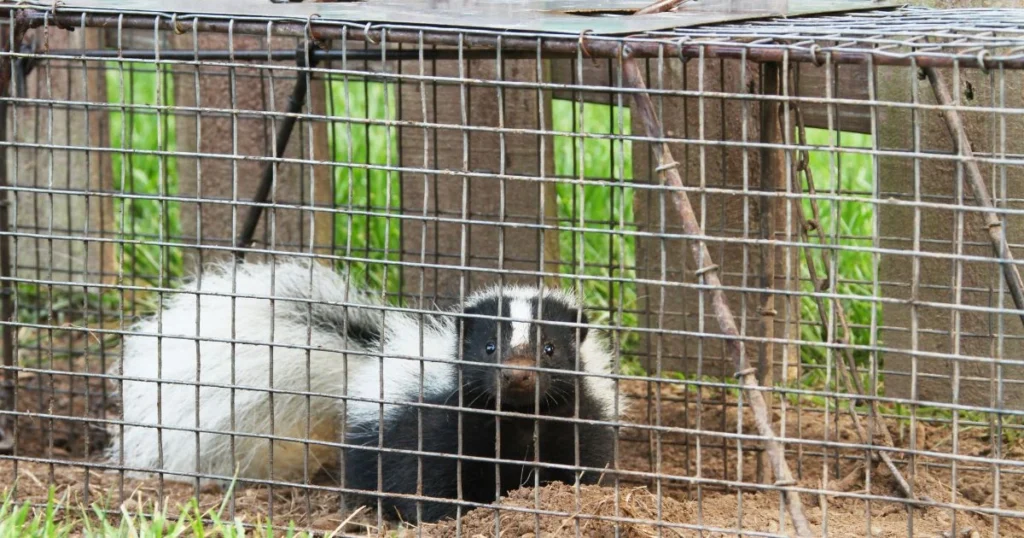
Anyone involved in skunk trapping must understand the legal landscape surrounding this practice. Specific regulations and guidelines for humanely treating these animals vary by location.
Each state has its own laws governing skunk trapping. For example, some states require a permit for trapping wildlife, including skunks. Regulations may dictate the trapping methods, specific seasons when trapping is permitted, and local wildlife management rules.
Key aspects include:
Ignoring these laws can result in penalties or fines. Individuals should consult their state’s wildlife agency or local ordinances to ensure compliance.
Humane trapping practices are essential for minimizing suffering and adhering to ethical standards. Live traps are often encouraged, allowing skunks to be relocated rather than harmed.
Considerations include:
These practices help ensure the welfare of skunks and promote responsible wildlife management. Following humane guidelines is not only ethical but can also prevent legal repercussions.
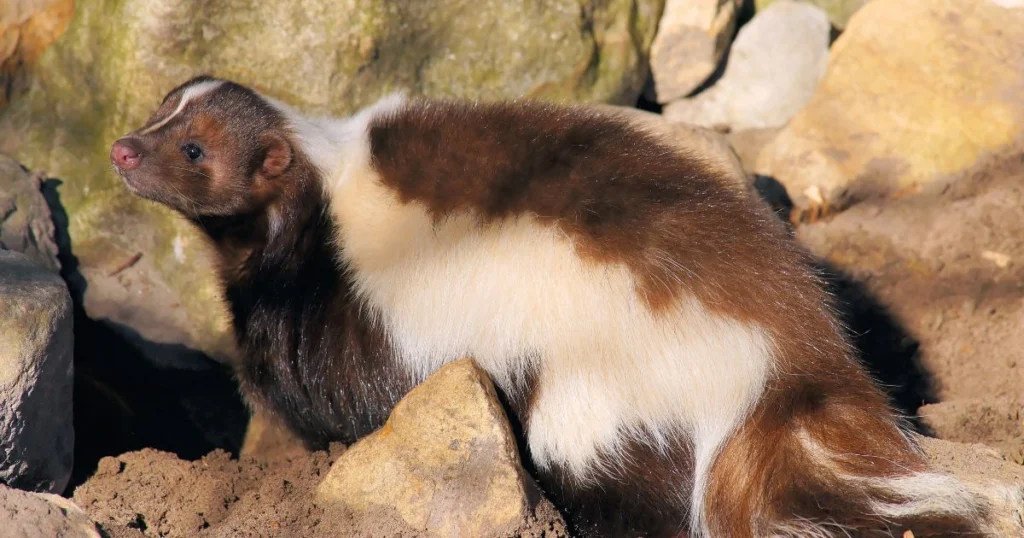
Professional skunk removal services provide expertise in safely and effectively managing skunk-related issues. For homeowners facing skunk problems, selecting a qualified skunk trapper and understanding the cost factors involved is crucial.
Selecting the right skunk trapper is essential for effective removal. Homeowners should seek professionals with experience in wildlife control and a strong reputation in the community.
Key considerations include:
A local search for “skunk removal service near me” can yield several options. Assessing multiple services can help you make a well-informed choice.
The cost of skunk removal varies based on several factors. Homeowners should consider the following elements when evaluating costs:
Skunk removal costs can range from $400 to $800, depending on these variables. For precise estimates, contact local skunk pest control services. Always seek multiple quotes to ensure competitive pricing.
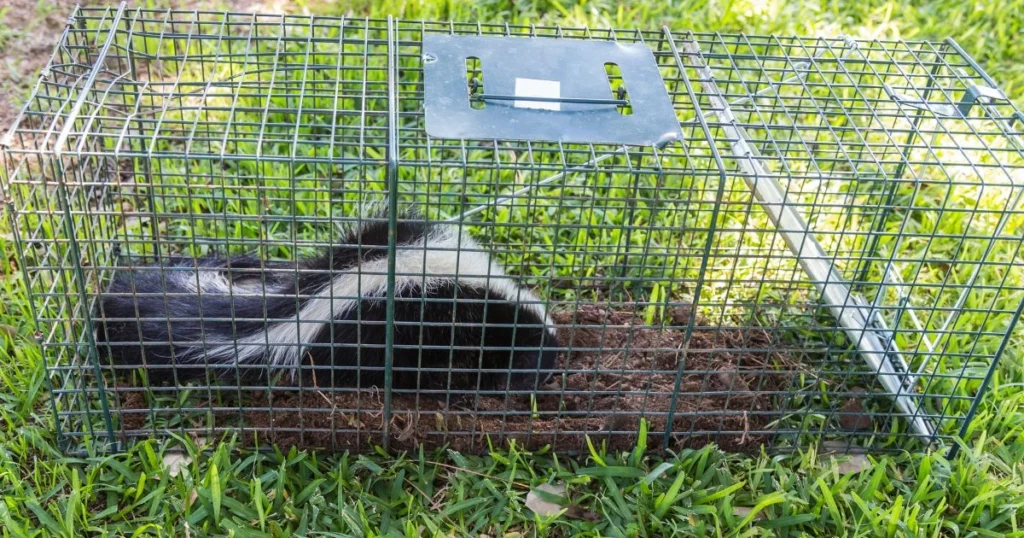
Trapping skunks requires careful techniques and safety precautions. Effective removal methods minimize the skunk's stress while ensuring the trapper's safety.
To trap skunks safely, use a live trap specifically designed for the animal's size, typically 10 to 12 inches wide by 30 to 36 inches long. Bait the trap with attractive food items such as peanut butter, canned tuna, or marshmallows. Position the trap in areas where skunks are active, like near their burrows or along odor trails.
Covering the trap with leaves or cloth can give skunks a sense of security. It's essential to check the trap frequently, as prolonged confinement can lead to stress or injury. Once trapped, the skunk should be released in a suitable location at least several miles away to prevent return.
Safety gloves are crucial when handling a trapped skunk, as they can prevent contact and potential bites. It is also advisable to approach the trap calmly and avoid sudden movements to reduce the risk of the skunk spraying.
Release the skunk in a remote area away from residential zones. For those uncomfortable handling skunks, seeking professional help from skunk trappers or skunk catchers nearby can be a wise choice. They can ensure proper handling and relocation in line with local regulations.
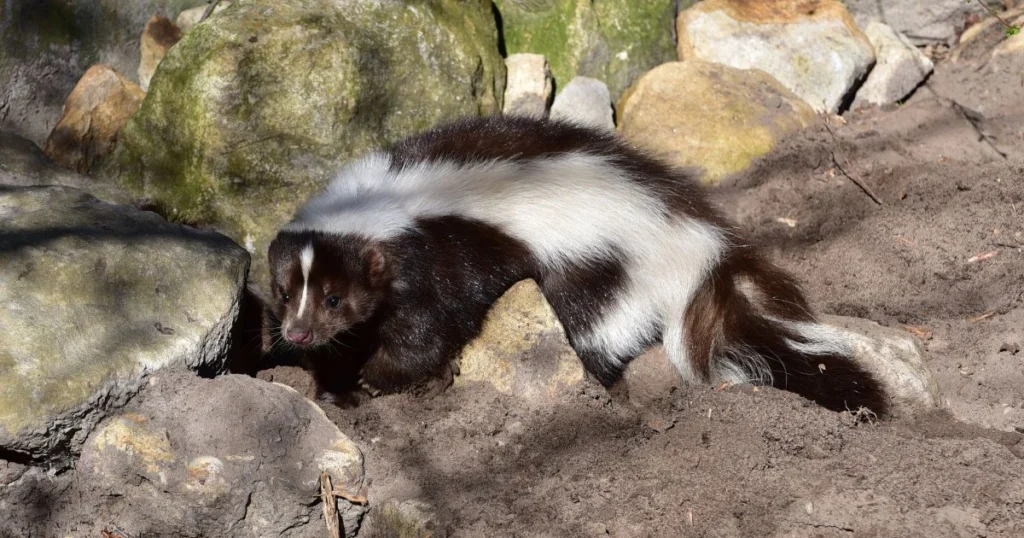
Skunk odor can be persistent and requires prompt attention to minimize its effects. Proper clean-up methods and remedies can significantly improve the restoration of the affected area.
Home remedies can effectively neutralize skunk odors. A popular mix involves combining:
Apply this solution immediately to the affected area. Wear gloves to protect the skin while applying the mixture.
White vinegar and water (1:1 ratio) can help with fabrics and upholstery. Soak the affected area for 15-30 minutes before rinsing with clean water.
Another method involves sprinkling activated charcoal or baking soda over surfaces to absorb odors. Both options should be left in place for several hours or overnight for best results.
When home remedies do not suffice, seeking professional skunk odor removal services can be beneficial. These experts use advanced techniques and equipment tailored for strong odors.
Professionals typically employ ozone generators or thermal fogging, which can penetrate deep into materials and effectively neutralize the odor. They also assess the damage and provide targeted treatment plans that address the specific needs of the home or property.
Choosing a reputable service is essential. Reading reviews and checking certifications ensures the selected company uses safe and effective methods for skunk odor removal. Investing in professional help can save time and reduce hassle compared to DIY methods, especially for severe infestations.
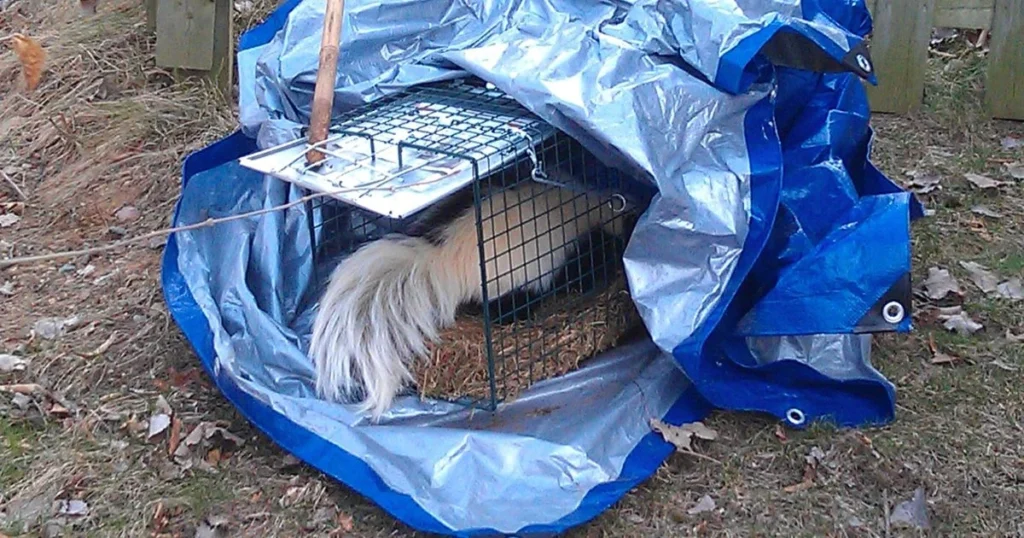
After removal, taking steps to prevent future skunk issues is crucial. Long-term deterrents and regular monitoring can help maintain a skunk-free environment.
Effective deterrents play a vital role in keeping skunks away. Landscaping adjustments can significantly reduce their appeal. For instance, removing dense shrubs, tall grass, and wood piles eliminates hiding spots.
Also, consider installing secure fencing that extends underground to prevent burrowing. Utilizing repellents, such as certain essential oils or chemical sprays, can also discourage skunks from returning.
Maintaining cleanliness with secured trash bins and compost piles minimizes food sources. Engaging professional skunk exterminators near you can provide additional expertise and guidance on effective strategies to deter wildlife consistently.
Regular inspection of the property can identify potential re-entry points for skunks. Periodically check all areas, focusing on basements, attics, and crawl spaces. Any gaps or damages should be promptly repaired.
Maintaining a clean yard is essential. Routine waste management and promptly removing fallen fruits or pet food outside significantly reduce attractants.
Monitoring wildlife movements through night cameras can also help spot any returning skunks.
For property owners seeking assistance, pest control skunk removal services can offer strategies tailored to specific situations. Critter Stop is an excellent option, known for its stellar reputation and quality service. Homeowners can call Critter Stop at (214) 234-2616 for a free inspection to effectively address wildlife or pest issues.
The following covers essential questions regarding the role of skunk trappers, humane removal techniques, and reliable services. Understanding these points can assist in effectively managing skunk-related issues.
A skunk trapper assesses the property to identify skunk activity and entry points. They use humane traps and techniques to capture the skunks without harming them, ensuring a safe removal process.
Searching online for local wildlife control services or asking for recommendations from neighbors can yield reliable options. Check customer reviews and verify their licensing and experience in skunk trapping.
Humane trapping methods include using baited cage traps that allow for safe capture. Trappers ensure minimal animal stress by selecting appropriate locations and monitoring traps regularly.
Skunk relocation involves capturing and transporting the animal to a suitable environment, far from residential areas. This technique is humane as it prevents harm to the skunk and mitigates the chances of return.
Local directories, online searches, and pest control associations can help find licensed skunk pest control services. Look for companies with experience and positive feedback from previous clients.
Skunk control services provide assessments, trapping, removal, and preventive measures to manage skunk populations. Professionals develop tailored strategies based on the specific situation and property layout.
Trappers remove skunks and identify and seal entry points and breeding areas. This proactive approach reduces the likelihood of future infestations and long-lasting problems.
Identifying the best skunk catcher involves researching local wildlife specialists. Prioritize those with proven records in humane practices and effective removal methods.
Many wildlife removal services employ skilled professionals familiar with skunk behavior and habitat. Conducting thorough research helps find those who specialize specifically in skunk removal.
Professional skunk odor removal often includes cleaning contaminated areas and applying special treatments to neutralize odors. This process can be very effective when performed promptly and thoroughly.
Trappers utilize humane traps and follow local regulations regarding wildlife. They prioritize the animal's well-being throughout the trapping and relocation process to ensure ethical treatment.
Costs for skunk removal can vary depending on location, service complexity, and the size of the infestation. Additional factors include required property repairs and preventive measures.
A skunk eliminator is a specialized service or method to remove skunks from troublesome areas. It may involve trapping, removal, and preventive strategies to deter future skunks.
Many pest control companies offer competitive pricing for skunk removal services. Local listings and bundled service offerings can lead to affordable solutions tailored to individual needs.
Common tools include live traps with bait, handling gloves, and monitoring devices. Skilled catchers also use techniques to minimize stress on the skunk during the capture process.
Service providers evaluate the property for vulnerabilities, recommend exclusion methods, and educate homeowners on skunk deterrents. These proactive measures are crucial for long-term prevention.
The removal process typically starts with an inspection, followed by trapping, removal, and repairs to minimize re-entry. Proper sanitation and communication with the homeowner are also essential.
Specialized services address contamination through thorough cleaning and deodorizing techniques. Targeting lingering odors and contaminants can effectively restore indoor air quality.
Cost variations arise from population density, accessibility, and local regulations. Urban areas may demand higher rates due to increased demand and potential hazards during removal.
Hiring a relocation service ensures that skunks are moved to safe habitats where they can thrive. It minimizes their chances of returning to problematic areas and adheres to humane treatment standards.
Searching through online reviews, local directories, or wildlife organizations can help locate reputable services. Selecting companies with proven expertise in rapid response is key for immediate assistance.
Professionals have the expertise, tools, and knowledge to handle skunk issues effectively and safely. They are trained to implement the best practices for trapping and preventing future encounters.
Skunk removal companies prioritize safety by adhering to local laws and using humane traps. They also undergo training in animal handling, ensuring ethical treatment throughout the removal process.
Visit our Critter Library and learn more about our furry friends